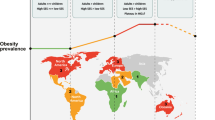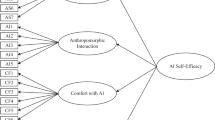Abstract
Background
Lifestyle intervention remains the cornerstone of weight loss programs in addition to pharmacological or surgical therapies. Artificial intelligence (AI) and other digital technologies can offer individualized approaches to lifestyle intervention to enable people with obesity to reach successful weight loss.
Methods
SureMediks, a digital lifestyle intervention platform using AI, was tested by 391 participants (58% women) with a broad range of BMI (20–78 kg/m2), with the aim of losing weight over 24 weeks in a multinational field trial. SureMediks consists of a mobile app, an Internet-connected scale, and a discipline of artificial intelligence called Expert system to provide individualized guidance and weight-loss management.
Results
All participants lost body weight (average 14%, range 4–22%). Almost all (98.7%) participants lost at least 5% of body weight, 75% lost at least 10%, 43% at least 15%, and 9% at least 20%, suggesting that this AI-powered lifestyle intervention was also effective in reducing the burden of obesity co-morbidities. Weight loss was partially positively correlated with female sex, accountability circle size, and participation in challenges, while it was negatively correlated with sub-goal reassignment. The latter three variables are specific features of the SureMediks weight loss program.
Conclusion
An AI-assisted lifestyle intervention allowed people with different body sizes to lose 14% body weight on average, with 99% of them losing more than 5%, over 24 weeks. These results show that digital technologies and AI might provide a successful means to lose weight, before, during, and after pharmacological or surgical therapies.
Graphical Abstract






Similar content being viewed by others
Data Availability
The data that support the findings of this study are available from the corresponding author upon reasonable request.
References
Powell-Wiley TM, Poirier P, Burke LE, et al. Obesity and cardiovascular disease: a scientific statement from the American Heart Association. Circulation. 2021;143(21):e984–1010.
Schwartz MW, Seeley RJ, Zeltser LM, et al. Obesity Pathogenesis: an endocrine society scientific statement. Endocr Rev. 2017;38(4):267–96.
Jensen MD, Ryan DH, Donato KA, et al. Guidelines (2013) for managing overweight and obesity in adults. Obesity. 2014;22(S2):S1-410.
Butryn ML, Webb V, Wadden TA. Behavioral treatment of obesity. Psychiatr Clin North Am. 2011;34(4):841–59.
Guidelines (2013) for managing overweight and obesity in adults. Preface to the executive summary. Obesity (Silver Spring). 2014;22 Suppl 2:S4.
Bettini S, Belligoli A, Fabris R, et al. Diet approach before and after bariatric surgery. Rev Endocr Metab Disord. 2020;21(3):297–306.
Kow L, Sharaiha RZ, O’Kane M, et al. Methodology and results of a joint IFSO-WGO Delphi survey of 94 intercontinental, interdisciplinary experts in obesity management. Obes Surg. 2023;33(11):3337–52.
Williams GC, Grow VM, Freedman ZR, et al. Motivational predictors of weight loss and weight-loss maintenance. J Pers Soc Psychol. 1996;70(1):115–26.
Soini S, Mustajoki P, Eriksson JG. Long-term weight maintenance after successful weight loss: motivational factors, support, difficulties, and success factors. Am J Health Behav. 2018;42(1):77–84.
West DS, Gorin AA, Subak LL, et al. A motivation-focused weight loss maintenance program is an effective alternative to a skill-based approach. Int J Obes (Lond). 2011;35(2):259–69.
Bradford TW, Grier SA, Henderson GR. Weight loss through virtual support communities: a role for identity-based motivation in public commitment. J Interact Mark. 2017;40(1):9–23.
Hwang KO, Ottenbacher AJ, Green AP, et al. Social support in an Internet weight loss community. Int J Med Inform. 2010;79(1):5–13.
Islam MM, Poly TN, Walther BA, et al. Use of mobile phone app interventions to promote weight loss: meta-analysis. JMIR Mhealth Uhealth. 2020;8(7):e17039.
Antoun J, Itani H, Alarab N, et al. The effectiveness of combining nonmobile interventions with the use of smartphone apps with various features for weight loss: systematic review and meta-analysis. JMIR Mhealth Uhealth. 2022;10(4):e35479.
Timpel P, Cesena FHY, da Silva CC, et al. Efficacy of gamification-based smartphone application for weight loss in overweight and obese adolescents: study protocol for a phase II randomized controlled trial. Ther Adv Endocrinol Metab. 2018;9(6):167–76.
Winpenny EM, Smith M, Penney T, et al. Changes in physical activity, diet, and body weight across the education and employment transitions of early adulthood: a systematic review and meta-analysis. Obes Rev. 2020;21(4):e12962.
Hollis JF, Gullion CM, Stevens VJ, et al. Weight loss during the intensive intervention phase of the weight-loss maintenance trial. Am J Prev Med. 2008;35(2):118–26.
McTiernan A, Sorensen B, Irwin ML, et al. Exercise effect on weight and body fat in men and women. Obesity (Silver Spring). 2007;15(6):1496–512.
Frie K, Hartmann-Boyce J, Jebb S, et al. Patterns in weight and physical activity tracking data preceding a stop in weight monitoring: observational analysis. J Med Internet Res. 2020;22(3):e15790.
Stein N, Brooks K. A Fully Automated conversational artificial intelligence for weight loss: longitudinal observational study among overweight and obese adults. JMIR Diabetes. 2017;2(2):e28.
Forman EM, Berry MP, Butryn ML, et al. Using artificial intelligence to optimize delivery of weight loss treatment: protocol for an efficacy and cost-effectiveness trial. Contemp Clin Trials. 2023;124:107029.
Turner-McGrievy G, Tate D. Tweets, apps, and pods: results of the 6-month mobile pounds off digitally (mobile POD) randomized weight-loss intervention among adults. J Med Internet Res. 2011;13(4):e120.
Jeffery RW, Wing RR, Mayer RR. Are smaller weight losses or more achievable weight loss goals better in the long term for obese patients? J Consult Clin Psychol. 1998;66(4):641–5.
Wilding JPH, Batterham RL, Calanna S, et al. Once-weekly semaglutide in adults with overweight or obesity. N Engl J Med. 2021;384(11):989–1002.
Wadden TA, Chao AM, Moore M, et al. The role of lifestyle modification with second-generation anti-obesity medications: comparisons, questions, and clinical opportunities. Curr Obes Rep. 2023;12(4):453–73.
Ryan DH, Yockey SR. Weight loss and improvement in comorbidity: differences at 5%, 10%, 15%, and over. Curr Obes Rep. 2017;6(2):187–94.
Chhabria K, Ross KM, Sacco SJ, et al. The assessment of supportive accountability in adults seeking obesity treatment: psychometric validation study. J Med Internet Res. 2020;22(7):e17967.
O’Brien PE, Hindle A, Brennan L, et al. Long-term outcomes after bariatric surgery: a systematic review and meta-analysis of weight loss at 10 or more years for all bariatric procedures and a single-centre review of 20-year outcomes after adjustable gastric banding. Obes Surg. 2019;29(1):3–14.
Wadden TA, Tronieri JS, Butryn ML. Lifestyle modification approaches for the treatment of obesity in adults. Am Psychol. 2020;75(2):235–51.
Acknowledgements
We would like to thank our participants and their commitment to their dedicated time. Their compliance and dedication to our field trial were commendable. We would also like to thank Mr. Kannan Palaniswami for his efficient technical support and Ms. Helga Andersen for her moral support in completing the field trial and organizing the database.
Author information
Authors and Affiliations
Corresponding author
Ethics declarations
Ethics Statement
All procedures performed in studies involving human participants were in accordance with the ethical standards of the institutional and/or national research committee and with the 1964 Helsinki Declaration and its later amendments or comparable ethical standards.
Consent to Participate
Consent from all the participants was taken after they had read the details of the trial, understood, and voluntarily consented to participate in the field trial.
Conflict of Interest
Sarfraz Khokhar is a scientific officer at Rasimo Systems where SureMediks is a research and development project. Angelo Del Parigi is a senior advisor for Rasimo System. Catherine Toomer is a medical advisor for Rasimo System. John Holden has no conflict of interest.
Additional information
Publisher's Note
Springer Nature remains neutral with regard to jurisdictional claims in published maps and institutional affiliations.
Key Points
• Lifestyle intervention is the cornerstone of weight loss programs and digital technologies can enhance personalization, engagement, and effectiveness.
• An AI-based digital weight loss platform consisting of a mobile app, an Internet-connected scale, and an AI-based system to provide individualized guidance and weight-loss management was tested in a multinational field trial.
• A sample of 391 participants with a broad range of BMI, accomplished 14% (range 4–22%) weight loss over 24 weeks.
• Almost all (99%) participants lost at least 5% of body weight, suggesting that this AI-powered lifestyle intervention can reduce the burden of obesity co-comorbidities.
Rights and permissions
Springer Nature or its licensor (e.g. a society or other partner) holds exclusive rights to this article under a publishing agreement with the author(s) or other rightsholder(s); author self-archiving of the accepted manuscript version of this article is solely governed by the terms of such publishing agreement and applicable law.
About this article
Cite this article
Khokhar, S., Holden, J., Toomer, C. et al. Weight Loss with an AI-Powered Digital Platform for Lifestyle Intervention. OBES SURG 34, 1810–1818 (2024). https://doi.org/10.1007/s11695-024-07209-1
Received:
Revised:
Accepted:
Published:
Issue Date:
DOI: https://doi.org/10.1007/s11695-024-07209-1




